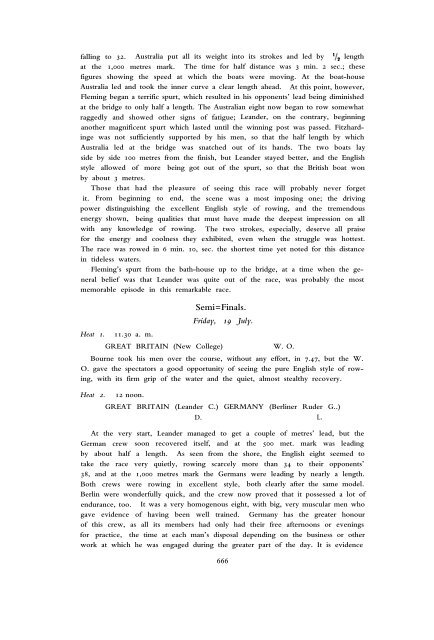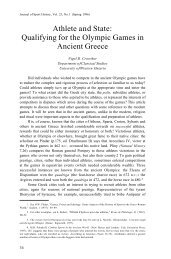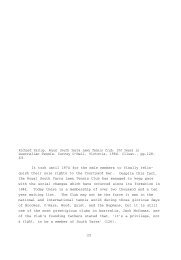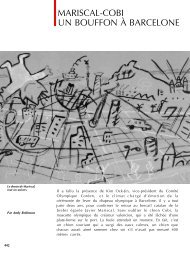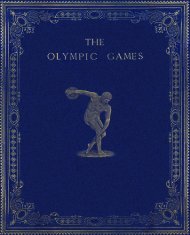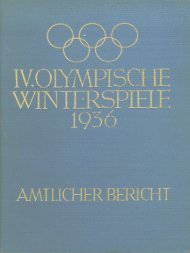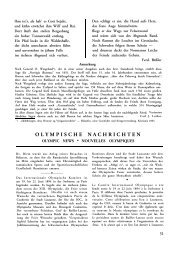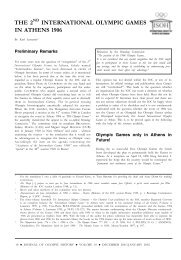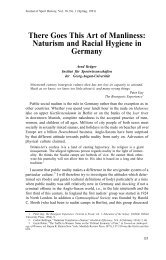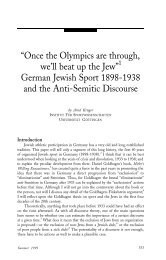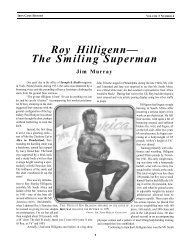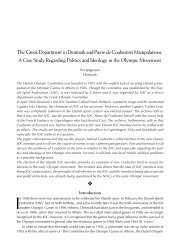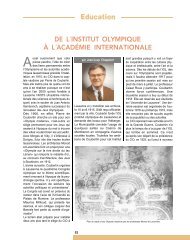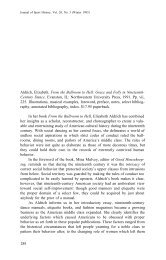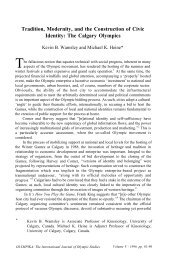- Page 1 and 2:
THE TUG-OF-WAR.ITS ORGANIZATION.he
- Page 3 and 4:
Pl. 172.GT. BRITAIN’S TUG-OF-WAR
- Page 5 and 6:
the flags of the competing nations
- Page 7 and 8:
CYCLING.ROAD RACE ROUND LAKE MÄLAR
- Page 9 and 10:
Germany asked to have Cycle-Polo an
- Page 11 and 12:
3) The obtaining aid from the local
- Page 13 and 14:
in that group, were first drawn, be
- Page 15 and 16:
of the competitors, too, of course.
- Page 17 and 18:
number of its guests from abroad to
- Page 19 and 20:
whole day, from 3 a. m. until 5 or
- Page 21 and 22:
R. LEWIS, South Africa, chaired by
- Page 23 and 24:
AtorderVästerås, c:a 200 kilometr
- Page 25 and 26:
The times required for the distance
- Page 27 and 28:
No. Name NationHour ofarrivalat the
- Page 29 and 30:
COMPARISONS.After what has been sai
- Page 31 and 32:
Comparative Table of Results gained
- Page 33 and 34:
Strictly speaking, cycling does not
- Page 35 and 36:
minative of the proper carrying out
- Page 37 and 38:
ÉPÉE TEAM COMPETITION.
- Page 39 and 40:
FINAL IN SABRE COMPETITON.FUCHS (Hu
- Page 41 and 42:
GROUP OF COMPETITORS IN ÉPÉE IN I
- Page 43 and 44:
GREAT BRITAIN’S TEAM IN SABRE COM
- Page 45 and 46:
Time Table for theof the Olympic Ga
- Page 47 and 48:
of the competitions. Our stating th
- Page 49 and 50:
THE FENCING.At 5 p. m. on the 5 Jul
- Page 51 and 52:
VVINotaris, S.Willems, V.Rayner, H.
- Page 53 and 54:
the rival school, on the same occas
- Page 55 and 56:
contest was one of special interest
- Page 57 and 58:
XVMoore, J. M. U. S. A.van Blijenbo
- Page 59 and 60:
onze medals in the individual event
- Page 61 and 62:
IXXXIXIIGopphold de Lobsdorf,K. Hun
- Page 63 and 64:
Result: 1. J. FUCHSHungary.2. B. B
- Page 65 and 66:
FOOTBALL.THE INCLUSION OF FOOTBALL
- Page 67 and 68:
GREAT BRITAIN (white jerseys) V. DE
- Page 69 and 70:
FROM THE FOOTBALL FINAL, GREAT BRIT
- Page 71 and 72:
FinanceCommittee:Messrs. CARL HELLB
- Page 73 and 74:
Referees.The Football Committee whi
- Page 75 and 76:
of the second half. Comers were for
- Page 77 and 78:
chance went when, a minute later, A
- Page 79 and 80:
and made a very pretty goal. The fi
- Page 81 and 82:
could not get past Göbel who, duri
- Page 83 and 84:
places, but Jorgensen shadowed the
- Page 85 and 86:
This goal made the British team une
- Page 87 and 88:
FOOTBALL. HOLLAND v. SWEDEN. The Du
- Page 89 and 90:
Pl. 190.FOOTBALL.GREAT BRITAIN (whi
- Page 91 and 92:
Pl. 192.HOLLAND’S FOOTBALL TEAM.I
- Page 93 and 94:
PL 194.SWEDEN'S FOOTBALL TEAM.GERMA
- Page 95 and 96:
Had they been opposed by a first cl
- Page 97 and 98:
had shown against Sweden. During th
- Page 99 and 100:
SOME GENERAL REFLECTIONS AND WISHES
- Page 101 and 102:
his best when working in the midst
- Page 103 and 104:
After a number of alterations — c
- Page 105 and 106:
Detail-drawing, showing method of f
- Page 107 and 108:
Detail-drawing showing method of fa
- Page 109 and 110:
times by the chief leader, who then
- Page 111 and 112:
THE SWEDISH GYMNASTS IN TEAM COMPET
- Page 113 and 114:
Pl. 198THE SWEDISH GYMNASTS IN TEAM
- Page 115 and 116:
THE BRITISH GYMNASTS IN TEAM COMPET
- Page 117 and 118:
THE LUXEMBURG GYMNASTS IN TEAM COMP
- Page 119 and 120:
Inside jump.Outside jump.Balance ju
- Page 121 and 122:
GENERALPROTOCOL.I. Team Competition
- Page 123 and 124:
Programme.A) EXERCICES D’ENSEMBLE
- Page 125 and 126:
IV. 1. 2. Poser le pied gauche sur
- Page 127 and 128:
Programme.1. Übung.FREIÜBUNGEN.R
- Page 129 and 130:
Kniestrecken mit einer ‘/4 Drehun
- Page 131 and 132:
auf dem linken Schenkel —, linke
- Page 133 and 134:
III. Seitstand.Felgaufschwung rück
- Page 135 and 136:
THE NORWEGIAN GYMNASTS IN TEAM COME
- Page 137 and 138:
DISPLAY BY SWEDISH GYMNASTS.
- Page 139 and 140:
Step R. foot forward down, arms hor
- Page 141 and 142:
Exercise 2.Raise R. leg sidewards (
- Page 143 and 144:
Underswing and backs up to front re
- Page 145 and 146:
III. 3-4. Quart de tour à gauche,
- Page 147 and 148:
3. — Changer la prise, mains deva
- Page 149 and 150:
Troisième Degré.Attention. — Pr
- Page 151 and 152:
A. Free CarriageExecutionB. Hor. Ba
- Page 153 and 154:
6.1. Senken mit gestreckten Hüften
- Page 155 and 156:
DISPLAY-TEAM OF DANISH GYMNASTS.
- Page 157 and 158:
Pl. 210.MARCH PAST OF DANISH WOMEN
- Page 159 and 160:
Verharren in dieser Stellung.Grunds
- Page 161 and 162:
Clasp—Wave—Toes-fast position.
- Page 163 and 164:
Zehenstand. Stab vor-hochheben.Seit
- Page 165 and 166:
zontale. Les flexions des membres i
- Page 167 and 168:
DISPLAY BY FINNISH WOMEN GYMNASTS,
- Page 169 and 170:
Faire face en arrière en tournant
- Page 171 and 172:
INDIVIDUAL COMPETITION.Friday, 12 J
- Page 173 and 174:
The introductory exercises, marchin
- Page 175 and 176:
— the system employed — for the
- Page 177 and 178:
DISPLAY BY SWEDISH WOMEN GYMNASTS.
- Page 179 and 180:
DISPLAY BY SWEDISH WOMAN GYMNASTS C
- Page 181 and 182:
the two latter moments, one might v
- Page 183 and 184:
HORSE RIDING COMPETITIONS.t was fir
- Page 185 and 186:
During the spring of 1910 the follo
- Page 187 and 188:
of the kind at which no money prize
- Page 189 and 190:
THE STADIUM DURING THE PRIZE JUMPIN
- Page 191 and 192:
THE COMPETITORS IS THE HORSE RIDING
- Page 193 and 194:
taking part in the Games. In conseq
- Page 195 and 196:
hand it was thought possible that s
- Page 197 and 198:
the try outs, while the money prize
- Page 199 and 200:
with the exception that the try out
- Page 201 and 202:
President:Adjutant:B.Prize Riding:L
- Page 203 and 204:
Olympic Games of Stockholm, 1912 an
- Page 205 and 206:
Le résultat a dépassé toute notr
- Page 207 and 208:
Map of the Course for the Distance-
- Page 209 and 210:
Name of RiderCountryNameof HorseWhe
- Page 211 and 212:
Individual Placing after Trials 1 a
- Page 213 and 214:
Maximum time 2 min. 45 sec.Summary
- Page 215 and 216:
Final results.Name of RiderTrial 1
- Page 217 and 218:
Pl. 223.INDIVIDUAL COMPETITION IN T
- Page 219 and 220:
Pl. 225.INDIVIDUAL PRIZE JUMPING.H.
- Page 221 and 222:
Pl. 227.GERMANY’S TEAM IN TEAM PR
- Page 223 and 224:
H. M. THE KING PRESENTING THE 1:ST
- Page 225 and 226:
Name of RiderCountryName of HorseWh
- Page 227 and 228:
A. Individual competition.List of c
- Page 229 and 230:
Total maximum points 190A. Individu
- Page 231 and 232:
Name of RiderCountryName of HorseWh
- Page 233 and 234:
Those horses which, besides taking
- Page 235 and 236:
11,00 a.m.2,00 p.m.4,30—6,30 p.m.
- Page 237 and 238:
VI. Doctors and Veterinary Surgeons
- Page 239 and 240:
2. The rider shall weigh out not la
- Page 241 and 242:
Back of Entry-form for Horse Riding
- Page 243 and 244:
Sweden, to and from Stockholm (1:st
- Page 245 and 246:
LAWN TENNIS.REPORT OF THE LABOURS O
- Page 247 and 248:
and the draw was at once carried ou
- Page 249 and 250:
A W. Gore, the English ex-champion,
- Page 251 and 252:
M. Decugis, FranceJ. Just, BohemiaT
- Page 253 and 254:
Second Round.In the second round, a
- Page 255 and 256: Pl. 231.GENTLEMEN’S DOUBLES (cove
- Page 257 and 258: final Miss Aitchison and Roper-Barr
- Page 259 and 260: Gentlemen’s Singles.(Out-of-door
- Page 261 and 262: 1. Great Britain2. France3. Sweden4
- Page 263 and 264: Forth round.In the fourth round, So
- Page 265 and 266: FINAL IN GENTLEMAN'S DOUBLES (out-o
- Page 267 and 268: H. M. THE KING PRESENTING PRIZES FO
- Page 269 and 270: Gentlemen’s Doubles. (Out-of-door
- Page 271 and 272: quence of the bad luck attending hi
- Page 273 and 274: yeMrs. E. Amheim, SwedenC. O. Nylé
- Page 275 and 276: MODERNPENTATHLON.PREPARATORY WORK O
- Page 277 and 278: Pl. 237.ÉPÉE FENCING, MODERN PENT
- Page 279 and 280: AS regards the weapon, it was not c
- Page 281 and 282: ing their own. There were advantage
- Page 283 and 284: Pl. 239.CROSS-COUNTRY RACE, MODERN
- Page 285 and 286: SINGING THE SWEDISH NATIONAL ANTHEM
- Page 287 and 288: If two or more competitors had the
- Page 289 and 290: NameNationPoints per shotNo. ofmiss
- Page 291 and 292: NameNationPoints per shotNo. ofmiss
- Page 293 and 294: Table showing the result of the Fen
- Page 295 and 296: NameNationDeduction of points for c
- Page 297 and 298: NameNationPointsShoot- Swim- Fenc-
- Page 299 and 300: THE PROGRAMME.The programme was at
- Page 301 and 302: THE HOUSING OF THE BOATS.The only p
- Page 303 and 304: and training, were quite superior t
- Page 305: ecovery, a powerful grip of the wat
- Page 309 and 310: of the race to make up the two clea
- Page 311 and 312: After a very energetic race up to t
- Page 313 and 314: EIGHTS, OUTRIGGERS, SEMI-FINAL. LEA
- Page 315 and 316: PL. 244.EIGHTS, OUTRIGGERS. NEW COL
- Page 317 and 318: Pl. 246.FOURS, OUTRIGGERS.THAMES RO
- Page 319 and 320: Pl. 248.SINGLE SCULLS. W. D. K INNE
- Page 321 and 322: victory was greeted by everyone —
- Page 323 and 324: that of any of his opponents, his l
- Page 325 and 326: SHOOTING.SHOOTING COMMITTEE.he Olym
- Page 327 and 328: and to take all other needful steps
- Page 329 and 330: GROUP OF ALL THE FOREIGN AND SWEDIS
- Page 331 and 332: RIFLE COMPETITIONS, KAKNÄSPl. 252
- Page 333 and 334: As the ranges at Kaknäs had only 6
- Page 335 and 336: PlacingNation Name 200 m. 400 m. 50
- Page 337 and 338: Placing Name Nation PointsHelgerud,
- Page 339 and 340: Placing Name Nationprec.SeriesAdded
- Page 341 and 342: Placing Nation NameStand- Kneel-Tot
- Page 343 and 344: It was, undeniably, with a certain
- Page 345 and 346: NationN a m eTot.pointsscored bycom
- Page 347 and 348: total distance of all the hits from
- Page 349 and 350: N a m eNationTotalpointsscoredby co
- Page 351 and 352: TotalN a m e NationpointsRemarksA.
- Page 353 and 354: The Swedish duel-shooting team dese
- Page 355 and 356: tion were also paid to miniature-ri
- Page 357 and 358:
U. S. A. MARSKMAN AT KAKNÄS
- Page 359 and 360:
Pl. 256.DENMARK’SRIFLE-TEAM.RIFLE
- Page 361 and 362:
Pl. 258.SWEDEN’SRIFLE-TEAM.SWEDEN
- Page 363 and 364:
A CLAY BIRD SHOOTING COMPETITION AT
- Page 365 and 366:
It will be seen by the rules of the
- Page 367 and 368:
There were 83 entries, from 13 nati
- Page 369 and 370:
Harry BlauBasile de SkrotskyDimitry
- Page 371 and 372:
Comparative list of results (given
- Page 373 and 374:
son and Th. Kumfeldt. A special Tra
- Page 375 and 376:
The water polo competition, too, wa
- Page 377 and 378:
Heat 8. 1. ERIC BERGQVIST, Sweden,
- Page 379 and 380:
pressed the leader hard, but the Au
- Page 381 and 382:
Pl. 262.LONG DISTANCE SWIMMING. G.
- Page 383 and 384:
Pl. 264.START FOR TEAM RACE, LADIES
- Page 385 and 386:
Final.7·40 p.m. Wednesday, 10 July
- Page 387 and 388:
5. C. Atkinson, Great Britain, 3 m.
- Page 389 and 390:
swam beautifully, beat Taylor for s
- Page 391 and 392:
Not placed:Sweden(G. I. Carlsson, A
- Page 393 and 394:
his style was not so clean as that
- Page 395 and 396:
General protocol of the competition
- Page 397 and 398:
General protocol of the competition
- Page 399 and 400:
pl. 19, p. 27.3. 5. Ester Edström,
- Page 401 and 402:
Zimmerman and Potts lay side by sid
- Page 403 and 404:
additional goals and Belgium 1, so
- Page 405 and 406:
Pl. 266.PLAIN AND VARIETY DIVING. H
- Page 407 and 408:
Pl. 268.PLAIN DIVING, LADIES.GRETA
- Page 409 and 410:
PLAIN DIVING, LADIES. ISABELLE WHIT
- Page 411 and 412:
WATER POLO.FRANCE v. SWEDEN.
- Page 413 and 414:
tain had no difficulty in increasin
- Page 415 and 416:
men only, the figures were soon bro
- Page 417 and 418:
them. In the high diving, Sweden wa
- Page 419 and 420:
WRESTLING.ORGANISATION.he Committee
- Page 421 and 422:
P l . 2 7 4WRESTLING. FEATHER WEIGH
- Page 423 and 424:
Pl. 276.WRESTLING. MIDDLE WEIGHT. A
- Page 425 and 426:
FEATHER WEIGHT.K. KOSKELO FinlandG.
- Page 427 and 428:
LightWeight.NameJosef (Stemmer) Sá
- Page 429 and 430:
MiddleWeight B.NameEdouard MartinIv
- Page 431 and 432:
distinguished themselves in this ev
- Page 433 and 434:
such a branch of athletics as wrest
- Page 435 and 436:
VESSELS WITH SPECTATORS, NYNÄSHAMN
- Page 437 and 438:
Another body that might otherwise h
- Page 439 and 440:
VIEW OF STARTING-PLACE FOR OLYMPIC
- Page 441 and 442:
“ERNA-SIGNE” (Sweden) and “HE
- Page 443 and 444:
Pl. 284.“SANS ATOUT” (Sweden)2:
- Page 445 and 446:
“TAIFUN” (Norway); “NORNAN”
- Page 447 and 448:
Friday,Saturday,Sunday,Monday,Tuesd
- Page 449 and 450:
stam; E. Sterner, L. Widberg, A. Lj
- Page 451 and 452:
This “Committee of Honour of the
- Page 453 and 454:
at Nynäshamn. Some lay outside the
- Page 455 and 456:
10-Metre class.Gallia IINinaMargaKi
- Page 457 and 458:
The positions in the various classe
- Page 459 and 460:
prizes, after which, 5 minutes late
- Page 461 and 462:
6-Metreclass.MAC MICHE G. Thubé &
- Page 463 and 464:
DISTRIBUTION OF PRIZES AT THE OLYMP
- Page 465 and 466:
H. M. THE KING CROWNING THE WINNER
- Page 467 and 468:
Pl. 292H. KOLEHMAINEN AT THE DISTRI
- Page 469 and 470:
Pl. 294H. R. H. THE CROWN PRINCE PR
- Page 471 and 472:
in front of the three tribunes. In
- Page 473 and 474:
Speeches were made, on proposing th
- Page 475 and 476:
On Sunday, 14 July, the Swedish Oly
- Page 477 and 478:
elles ont plus ou moins contribué
- Page 479 and 480:
the reasons that has impelled the S
- Page 481 and 482:
Speech made by H. R. H. Prince Wilh
- Page 483 and 484:
y means of our rules as to “compa
- Page 485 and 486:
The dinner, given on Wednesday, 3 J
- Page 487 and 488:
that, in the opinion of the Committ
- Page 489 and 490:
REPORT ISSUED BY THE JURY FORAWARDI
- Page 491 and 492:
most certainly in agreement with th
- Page 493 and 494:
opinion in the matter. These artist
- Page 495 and 496:
Painting:Gold Medal: G. PELLIGRINI,
- Page 497 and 498:
Muss fortgesetzt an Leib und Seele
- Page 499 and 500:
same time, affording a good opportu
- Page 501 and 502:
The result of all these kind servic
- Page 503 and 504:
A CORNER OF BOY SCOUTS’ CAMP, DJU
- Page 505 and 506:
Pl. 298.BOY SCOUTS’CAMP.ONE OFTHE
- Page 507 and 508:
“SVEA LEVE” (Long live Sweden).
- Page 509 and 510:
field, that the players there are u
- Page 511 and 512:
Pl. 300.ICELANDIC“GLIMA”-WRESTL
- Page 513 and 514:
that is held in special favour by e
- Page 515 and 516:
A nidtag (foul) is the term applied
- Page 517 and 518:
Pl. 302.VÄSTERÅS BASEBALL-CLUB TE
- Page 519 and 520:
Pl. 304.BASEBALL MATCH, U. S. A. v.
- Page 521 and 522:
As may be seen by the above report
- Page 523 and 524:
Olympic arenas, a general programme
- Page 525 and 526:
For example, the Royal Library exhi
- Page 527 and 528:
came the concert proper, consisting
- Page 529 and 530:
FRIES, K. A. E., surgeon-lieutenant
- Page 531 and 532:
Table I. Nationality of the Men Pat
- Page 533 and 534:
Table III.Nationality of the Women
- Page 535 and 536:
The most comprehensive measures of
- Page 537 and 538:
piads, it ought to be run during th
- Page 539 and 540:
STATISTICS, LIST OF OFFI=CIALS AND
- Page 541 and 542:
Classic soil was chosen as the scen
- Page 543 and 544:
Results obtained in the precedingOl
- Page 545 and 546:
CompetitionHolderRecordMade at theO
- Page 547 and 548:
I. F. W. KELLYII. J. WENDELLIII. W.
- Page 549 and 550:
Cycling Road Race round Lake Mälar
- Page 551 and 552:
Mixed Doubles.I. E. M. HANNAM—C.
- Page 553 and 554:
I. SWEDENII. RUSSIAIII. GREAT BRITA
- Page 555 and 556:
Wrestling.I. KALLE KOSKELOII. GEORG
- Page 557 and 558:
LIST OF COMPETITORS, WHO WON TWO I:
- Page 559 and 560:
COMPARISON BETWEEN THE SWEDISH OFFI
- Page 561 and 562:
Shooting with Miniature Rifle, ind.
- Page 563 and 564:
10 1:st prizes, 30 points:GREATBRIT
- Page 565 and 566:
Shooting: Clay Bird Competition, in
- Page 567 and 568:
2 2:nd prizes, 4 points: Swimming:
- Page 569 and 570:
LIST OF DIPLOMAS OF MERIT AWARDED A
- Page 571 and 572:
Throwing the Discus, best hand:MUCK
- Page 573 and 574:
Ind. Sabre competition:ANDRÉEFF, W
- Page 575 and 576:
Comp. q) CEDERSTRÖM, F.EKMAN, J. E
- Page 577 and 578:
TABLE SHOWING THE NUMBER OF STARTER
- Page 579 and 580:
TABLE OF DIPLOMAS OF MERIT AWARDED
- Page 581 and 582:
TABLE SHOWING PROPORTION BETWEEN TH
- Page 583 and 584:
Name Nation Branch of Athletics Com
- Page 585 and 586:
NameNationBranch of AthleticsCompet
- Page 587 and 588:
Name Nation Branch of Athletics Com
- Page 589 and 590:
NameNation Branch of Athletics Comp
- Page 591 and 592:
Name Nation Branch of AthleticsComp
- Page 593 and 594:
Name Nation Branch of Athletics Com
- Page 595 and 596:
Name Nation Branch of Athletics Com
- Page 597 and 598:
Name Nation Branch of Athletics Com
- Page 599 and 600:
Name Nation Branch of Athletics Com
- Page 601 and 602:
Name Nation Branch of Athletics Com
- Page 603 and 604:
Name Nation Branch of Athletics Com
- Page 605 and 606:
NameNationBranch of AthleticsCompet
- Page 607 and 608:
NameNationBranch of AthleticsCompet
- Page 609 and 610:
NameNationBranch of AthleticsCompet
- Page 611 and 612:
NameNationBranch of AthleticsCompet
- Page 613 and 614:
Name Nation Branch of Athletics Com
- Page 615 and 616:
NameNationBranch of AthleticsCompet
- Page 617 and 618:
Name Nation Branch of Athletics Com
- Page 619 and 620:
Name Nation Branch of Athletics Com
- Page 621 and 622:
NameNationBranch of AthleticsCompet
- Page 623 and 624:
Name Nation Branch of Athletics Com
- Page 625 and 626:
NameNationBranch of AthleticsCompet
- Page 627 and 628:
Name Nation Branch of AthleticsComp
- Page 629 and 630:
NameNationBranch of AthleticsCompet
- Page 631 and 632:
Name Nation Branch of Athletics Com
- Page 633 and 634:
Name Nation Branch of Athletics Com
- Page 635 and 636:
NameNationBranch of AthleticsCompet
- Page 637 and 638:
Name Nation Branch of Athletics Com
- Page 639 and 640:
Name Nation Branch of Athletics Com
- Page 641 and 642:
NameNationBranch of AthleticsCompet
- Page 643 and 644:
Name Address NationSouth African Am
- Page 645 and 646:
Name Address NationUnion des Socié
- Page 647 and 648:
Name Address NationUnion des Socié
- Page 649 and 650:
Major H. TennerWels, C. A.Prince Ot
- Page 651 and 652:
Bukh, Niels E.Clod-Hansen, Abr.Mrs
- Page 653 and 654:
CazaletChamp, PaulMarquis de Chasse
- Page 655 and 656:
Müller, Joh. J. P.Natusch, B.Obst,
- Page 657 and 658:
Ridley-Martin, A.Seligman, E.Simmon
- Page 659 and 660:
Professor Cesare TifiD:r F. Tonetti
- Page 661 and 662:
PORTUGAL.Correrira, FernandoCount d
- Page 663 and 664:
Hammond, G. M.Lieut. A. S. JonesKir
- Page 665 and 666:
LIST OF THE SWEDISH MEMBERS OFCOMMI
- Page 667 and 668:
Blidberg, CarlBlixen-Finecke, C. vo
- Page 669 and 670:
Eriksson, HenningEssen, C. vonEssen
- Page 671 and 672:
Hermansson, V. R.Hermelin, S. D. A.
- Page 673 and 674:
König, Cl.StockholmMemb. of Modern
- Page 675 and 676:
Löwenadler, P.Löwenthal, J.Magnus
- Page 677 and 678:
Regnell, L.Rettig, P.Richter, Augus
- Page 679 and 680:
Söderberg, E.Söderberg, G.Söderq
- Page 681 and 682:
Ålund, C. W.Åsbrink, GustafÖfver
- Page 683 and 684:
Högmark, FredJensen, K.Lomberg-Nie
- Page 685 and 686:
Page, A. H.Parker, W. A.Phillips, P
- Page 687 and 688:
SWITZERLAND.Gandard, V.Moeschlin, F
- Page 689 and 690:
RULES AND REGULATIONSFOR THE COMPET
- Page 691 and 692:
When the signal has been given to b
- Page 693 and 694:
In other respects the same regulati
- Page 695 and 696:
and thereafter, by a further 2 cm.
- Page 697 and 698:
this jump shall not be measured, bu
- Page 699 and 700:
Throwing the Discus.The discus shal
- Page 701 and 702:
hind the winner, he, like the secon
- Page 703 and 704:
c) The pulling shall take place wit
- Page 705 and 706:
FENCING.RULES FOR THE COMPETITIONS.
- Page 707 and 708:
The Ground.All the competitions wil
- Page 709 and 710:
CONSTITUTION OF THE POOLS.A. In the
- Page 711 and 712:
The Scoring Sheet will be on the fo
- Page 713 and 714:
c) If he tries to parry a stop-hit
- Page 715 and 716:
GYMNASTICS.GENERAL REGULATIONS.1. T
- Page 717 and 718:
The average of marks awarded for mo
- Page 719 and 720:
for the execution: 0 — 10 points
- Page 721 and 722:
5. Division and order of rotation o
- Page 723 and 724:
HORSE=RIDINGCOMPETITIONS.GENERAL RE
- Page 725 and 726:
3. Individual Riding over Steeplech
- Page 727 and 728:
5 obstacles to be taken at a gallop
- Page 729 and 730:
III.Prize=Jumping Competition.A. In
- Page 731 and 732:
Obstacles used in the Horse Riding
- Page 733 and 734:
Supplement 2.The “Military”.Pri
- Page 735 and 736:
parallel with it, are drawn the Ser
- Page 737 and 738:
called games-all; and so on until e
- Page 739 and 740:
No help may be rendered by any othe
- Page 741 and 742:
11. A boat not at the start at the
- Page 743 and 744:
When a boat is to be measured, it s
- Page 745 and 746:
5. Each competitor shall shoot two
- Page 747 and 748:
The series at the target shall cons
- Page 749 and 750:
e) Individual Competition. Distance
- Page 751 and 752:
j) Team Competition. Distance 50 me
- Page 753 and 754:
marksman not bowing to his decision
- Page 755 and 756:
(bull’s eye), and 30 cm. for 4; t
- Page 757 and 758:
SWIMMING.GENERAL REGULATIONS.1. The
- Page 759 and 760:
c) All variety dives must be made b
- Page 761 and 762:
) The competition shall comprise, p
- Page 763 and 764:
12. Captains. The captains shall be
- Page 765 and 766:
point where the ball leaves the fie
- Page 767 and 768:
High Dive.1. Backward Header. 2. Ba
- Page 769 and 770:
High Dive.4. Backward spring outwar
- Page 771 and 772:
High Dive.7. Armstand with overback
- Page 773 and 774:
High Dive.9. One somersault forward
- Page 775 and 776:
High Dive.11.One and a half somersa
- Page 777 and 778:
High Dive.13. Mollberg’s dive.108
- Page 779 and 780:
Spring Board Dive4. Screw Dive forw
- Page 781 and 782:
Spring Board Dive.11. Isander’s d
- Page 783 and 784:
WRESTLING.General Regulations.The c
- Page 785 and 786:
Example I:A beats B, B beats C:A I,
- Page 787 and 788:
13. The number of persons allowed o
- Page 789 and 790:
AFTERMATH.
- Page 791 and 792:
Grâce à la nation Suédoise dont
- Page 793 and 794:
Letter from James E. Sullivan, Esq.
- Page 795 and 796:
naissance éprouvée par toute notr
- Page 797 and 798:
ing our congratulations on Sweden
- Page 799 and 800:
as it is on mutual respect, friends
- Page 801 and 802:
(Translation.)The Swedish Olympic C
- Page 803 and 804:
Letter from Sidney H. Farrar, Esq.,


